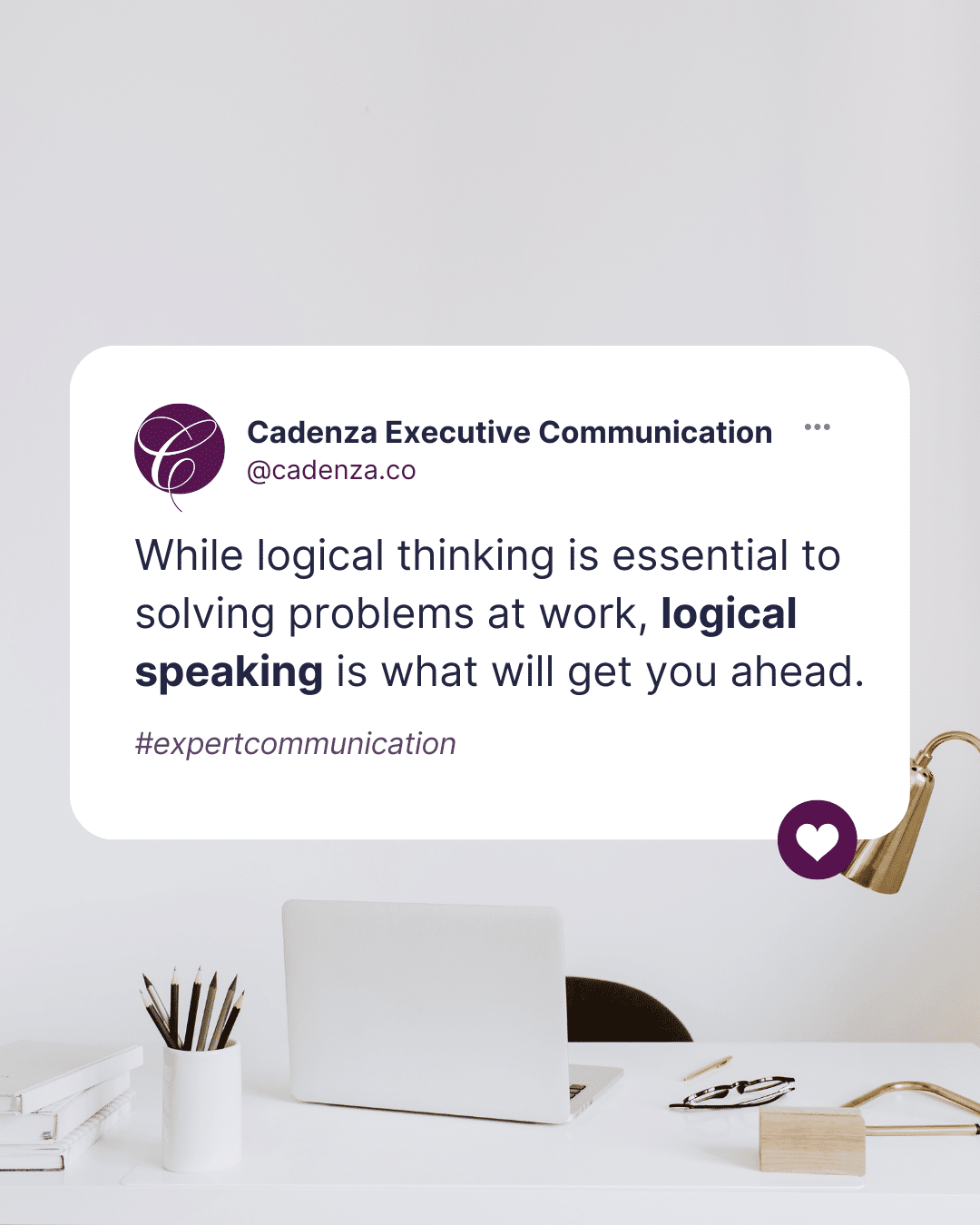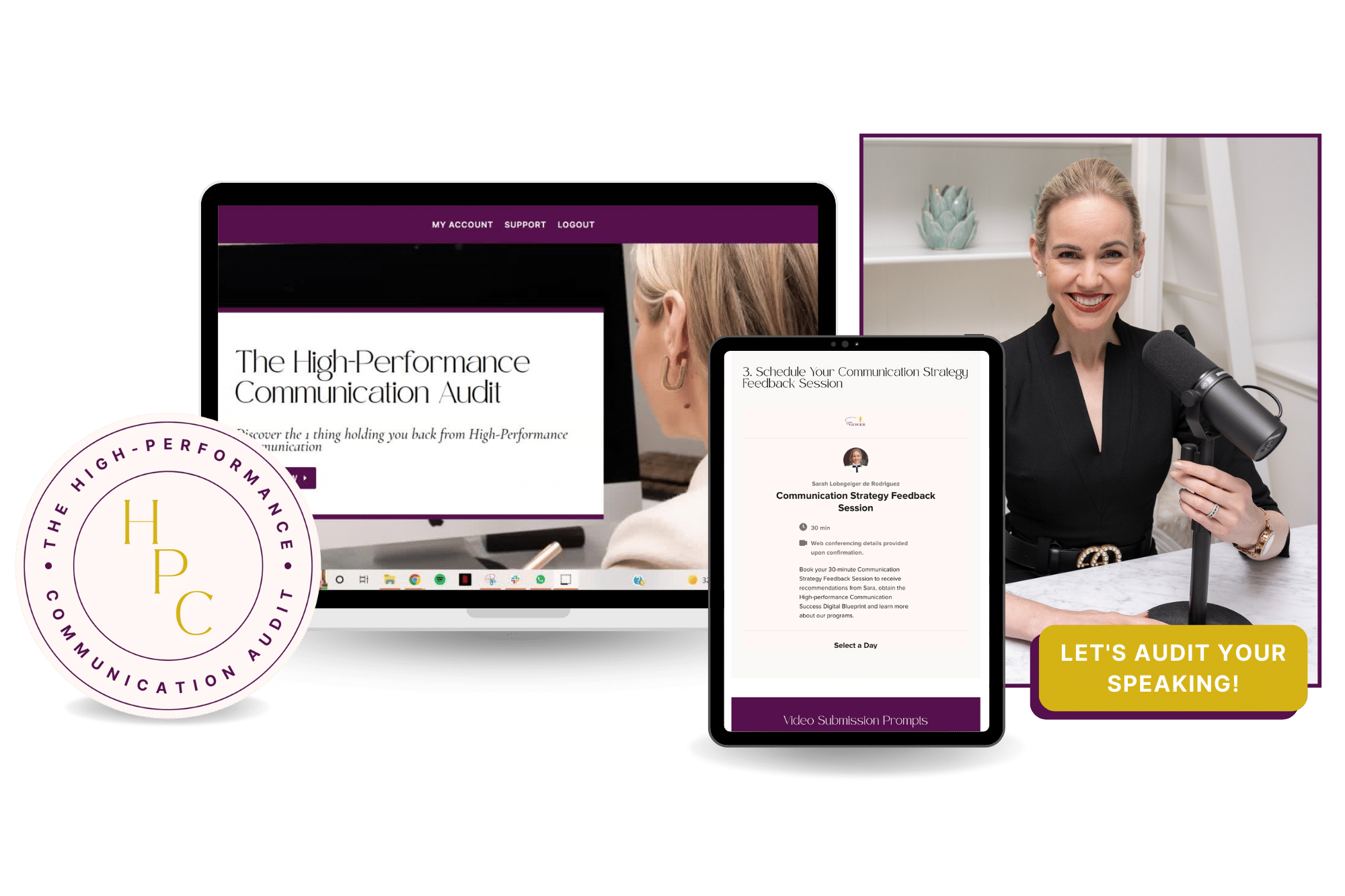Leadership Communication
Feel Like No One Listens to You? You Need Influential Communication Tools
Learn to communicate with influence & make your presence felt at work.

Uncover the perks of influential communication. When you learn to communicate with influence you’ll see a positive impact on your work performance, sense of belonging, and reputation.
Let’s take a moment to consider all those inspired solutions and ideas you think about sharing at work that you avoid bringing up in team meetings. Is it getting you down how the fast talkers steal the floor, share ideas you thought of ten minutes earlier and somehow manage to take the credit, applause and career progress over you? You could be facing an influence problem at work.
Today we’ll investigate:
- Communicating with influence and why it might be the missing skill waiting for your attention.
- Why influence at work matters
- The 3-parts of influence that shape your reputation at work
- Barriers to influence and how communication strategies upgrade influence
Self-efficacy drives communication influence.
In work environments where lateral skills dominate, such as software development, IT and STEM overall, most employees focus on their technical know-how at the expense of communication skills development. If you dedicate all your attention to coding in the corner, you’ll slow down your career ascension. Influence at work comes down to your communication skills.
Influence at work has many more benefits; here are a few unexpected perks to securing increased influence.
This blog post is best digested in 3 parts:
- Check the tips for summarised below
- Watch the vlog for more detailed training
- Start building your influential communication today by booking a professional speaking audit with CADENZA so that you can speak with more confidence at work and gain the influence your expertise deserves.
Gain a firmer grip on your speaking style when faced with contacts that challenge your confidence, skill and expertise.
If you want to expand your communication so that you’re always ready with the best response, even for a toxic boss, problematic contact or borderline uncivil communication, our High-Performance Communication Audit will give you deep insight into areas we can expand so that you can react and respond in the heat of the moment with a precise and strategic that protects your interest and showcases your expertise and right to dignity at work.
Influence at work determines how you feel at work.
The link between employee mental health and the psychosocial work environment is all too clear. Working life contributes to emotional and physical well-being (Bhakandarker and Rai, 2019).
But did you know that your degree of influence at work predicts your mental health?
Lack of influence at work translates to feelings of helplessness, powerlessness and lowered self-regulation (Czuba et al., 2019, Norrman Harling et al., 2020). Reduced autonomy and control over your workflow (job control) have some links to the incidence of clinical depression.
Influence at work comes down to how secure you feel about achieving impact in
- Performing your work tasks
- Maintaining your identity and reputation
- Solidifying and building your career path
Feeling heard at work is not all you need to assess your influence.
Anderson et al. provide a helpful matrix to consider your influence at work which we’ve summarised below.
#1 Influence over your work tasks
You can weigh up your influence and control over work tasks by considering how much you have a say in: when and how tasks are solved.
Employees with little control over when they complete a task and how they solve it will experience less influence at work.
Tips to gain more influence over your work tasks:
The ability to use direct and clear communication to state your workflow needs in a way that builds rapport with your team leader and manager will be determined by how skilful you are at using assertive communication.
Suppose you’re struggling to gain independence over how you complete tasks. In that case, the only solution is to use communication tactics to negotiate your responsibilities, boundaries and needs or seek a better role that grants more access to independence and autonomy.
Watch out for these behaviours:
If you’re reticent to speak up and position your value, insights and expertise, you may get caught in a situation where your superior manages every granular workflow detail. Before concluding that your manager is micromanaging you, consider whether you’ve intentionally used your communication to showcase your credibility and reputation at work. Then plan how you can better showcase your competence and expertise. If you need help in this area, this communication class can get you started.
Optimise your Voice Tone, Boost Your Delivery & Express Yourself Better.
I’ve provided speaking assessment and modern elocution training to people from all sorts of professions at different stages in their career path from middle management through to company directors.
Stop feeling second class in the office, because your ideas aren’t. You just need to learn to speak with authority, vocal charisma & clarity. My tools will show you how.
#2 Influence in your relationships at work
Your interpersonal effectiveness will fuel your workplace influence. Influential professionals experience more access to the exchange of ideas and knowledge with their colleagues. Influence makes you feel heard and gives you a voice to get more involved in team work processes. You’ll feel connected and heard because what you say affects others and notice people paying attention to your input.
Tips to gain more influence over your relationships at work:
Relationship-building skills are always worthwhile, especially if you feel like no one is listening to you. Influence will make your presence felt in team meetings and decision-making and ensure your expertise is noticed. In addition, you can enhance interpersonal effectiveness by learning more about strategic empathy, emotional intelligence, persuasive speaking and rapport building. It all comes down to investing in your social intelligence, an essential skill area that my programs and services will develop for you using research-informed tools.
Watch out for these behaviours:
All workplaces should encourage diverse communication styles and behaviours; however, research indicates that employees who build relationships progress faster professionally. So if you find yourself sitting out of conversations, or team meetings, don’t let your personality block your career security. How you communicate at work comes down to more the tools you use than your temperament. Anyone can learn to develop interpersonal skills, meeting room participation and speaking authority with the right speaking system.
#3 Influence and your identity at work
Increased influence at work will positively affect how you see yourself at work, shaping your self-esteem, self-worth and confidence. In addition, employees that exert more influence at work tend to perceive a higher personal value.
Tips to gain more influence over your identity at work:
Your skills and expertise won’t determine your influence as fast as your communication. So if you’re finding it takes time to build up trust in your competence at work, you can fast-track influence by working on how you showcase the value you have to offer, and this all comes down to your communication skills. I talk more about how expertise and experience don’t correlate with career ascension in this article: The Undercover Toolkit of a Charismatic Leader that takes them to the Top.
Watch out for these behaviours:
IInfluential individuals hold a higher reputation at work because they successfully showcase their ideas, expertise and skills through communication. This is why typically, extroverts tend to gain leadership roles over introverts. We must recognize the verified bias that smooth talkers get over imprecise and tangential speakers (de Vries et al., 2020).

Logical speakers gain a cognitive sophistication bias, employees with clear voice tone are perceived as more interpersonally relevant and charismatic communicators outdo others in gaining management positions (Silvia & Beaty, 2012; Davis et al., 2017; Caballero, 2021).
What you say and how you sound will determine your influence at work.
You can improve your interaction style, speaking eloquence and charisma, no matter your personality so that you Look, Sound and Feel confident at work– take this masterclass to get started.
And when you have influence at work you’ll secure improved performance, sense of Belonging as well as reputation gains.
So now that we’ve learnt all the benefits of holding influence at work, how do we go about attaining it?
Influence is a strong predictor of innovation success.
When it comes to technological innovation, research has shown that champion innovators use “a wider variety of influence tactics than non-champions (Howell & Higgins, 1990).”
If you’re working in the tech industry, your innovations will gain an advantage if you focus on improving your leadership communication skills and charisma. Designing a new machine, product or solution, concentrate as much on influential communication skills as your genius innovation because communication will propel how well the marketplace, venture capitalists and industry adopt your solution.
Sales communication competence is a marker of influence.
Do you sell products, ideas or services to stakeholders and business customers? Your selling competence will always come down to communication skills, especially if delivering B2B solutions. Recent research in the Journal of Industrial Marketing Management by Koponen et al. (2021) discusses the importance of relationship selling, built through long-term customer retention. The researchers discovered that leadership skills influence sales outcomes as much as selling skills.
Influential communication starts with self-awareness & detailed assessment of your speaking style, strengths and setbacks.
If you want to improve your communication, you need to know this: There are 6 critical bottlenecks that will hold you back from clear and confident communication and speaking with authority & expertise.
You need to learn what your #1 bottleneck is before you can fix it. Solving this problem for clients from all over the world is what I do all day, every day through my modern elocution services…
When it comes to confidence and influence at work, there’s always a massive gap between looking confident and feeling confident when you’re under pressure.
So how can you communicate with influence more effectively at work?
If you want to build your social connection skills and confidence when communicating at work or in your social life, start by setting concrete interpersonal communication goals. Our High-Performance Communication Audit does the heavy lifting for you.
First, you’ll receive detailed care and motivation from an expert who will genuinely assist you in communicating more effectively.
Then you’ll finally get clarity on what to do to improve your speaking at work.
PLUS,
Each audit comes with a bonus Blueprint Strategy session with our director, Sarah, which is pretty neat because her calendar is so gridlocked it’s one of the few ways to sit with her 1-1 these days.
This session will teach you the 1 Thing Holding You Back from High-Performance Communication.
So who is this audit best for?
YOU if you want to take your communication in daily life further to increase listener engagement, build engagement and get the desired outcomes!
Also, YOU, if you’re preparing for high-performance communication activities where the stakes are high, like:
- job interviews,
- public speaking events,
- managing teams,
- giving your opinion in meetings,
- developing rapport with the people that matter,
- handling your communication in conflicts
You can commence the process quickly by purchasing & submitting your audit tasks via an ingenious virtual assessment- book your speaking audit here.
You’ll then schedule an appointment with our director to receive precise science-based insights into functional areas of your communication that you can optimise. Finally, we’ll have an in-person meeting in Collins Street, Melbourne or online, according to your preference, to solve your influence at work and give you strategic recommendations to advance your professional communication so that your expertise and reputation get the traction you deserve.
Discover your critical bottleneck holding your confidence and speaking back. Book your audit now.
References
-
Andersen, M. F., et al. (2022). “Influence at work is a key factor for mental health – but what do contemporary employees in knowledge and relational work mean by “influence at work”?” International Journal of Qualitative Studies on Health and Well-being 17(1): 2054513.
-
Bhandarker, A. and S. Rai (2019). “Toxic leadership: emotional distress and coping strategy.” International Journal of Organization Theory & Behavior.
-
Hiranrat, C., Harncharnchai, A., & Duangjan, C. (2021). Theory of Planned Behavior and the Influence of Communication Self-Efficacy on Intention to Pursue a Software Development Career. Journal of Information Systems Education, 32(1), 40-52.
-
Howell, J. M. and C. A. Higgins (1990). “Leadership behaviors, influence tactics, and career experiences of champions of technological innovation.” The Leadership Quarterly 1(4): 249-264.
-
Karasek, R., et al. (1998). “The Job Content Questionnaire (JCQ): An instrument for internationally comparative assessments of psychosocial job characteristics.” Educational Publishing Foundation, doi:10.1037/1076-8998.3.4.322.
-
Koponen, J., et al. (2019). “Sales communication competence in international B2B solution selling.” Industrial Marketing Management 82: 238-252.
-
Mauss, D., et al. (2018). “Validating the Demand Control Support Questionnaire among white-collar employees in Switzerland and the United States.” Journal of Occupational Medicine and Toxicology 13(1): 7.
Did you enjoy this post? Make sure to subscribe to our YouTube channel to get more content to increase your communication skills!
About the Author
Dr Sarah Lobegeiger de Rodriguez is a Keynote Speaker, Executive Speaking Coach, and Opera Singer who likes to play with words, sounds, and your impact.
Her academic background is in Music Performance, Communication Science and Speech & Language Pathology. She assists executive communication clients all over the world as a communication consultant with strong expertise in CEO, Founder and Entrepreneur communication strategies.
Connect with Sarah on LinkedIn.
© CADENZA
Level 14, 380 St Kilda Road, Melbourne, 3004
Privacy Policy
Terms & Conditions
Position Statement on Racism

